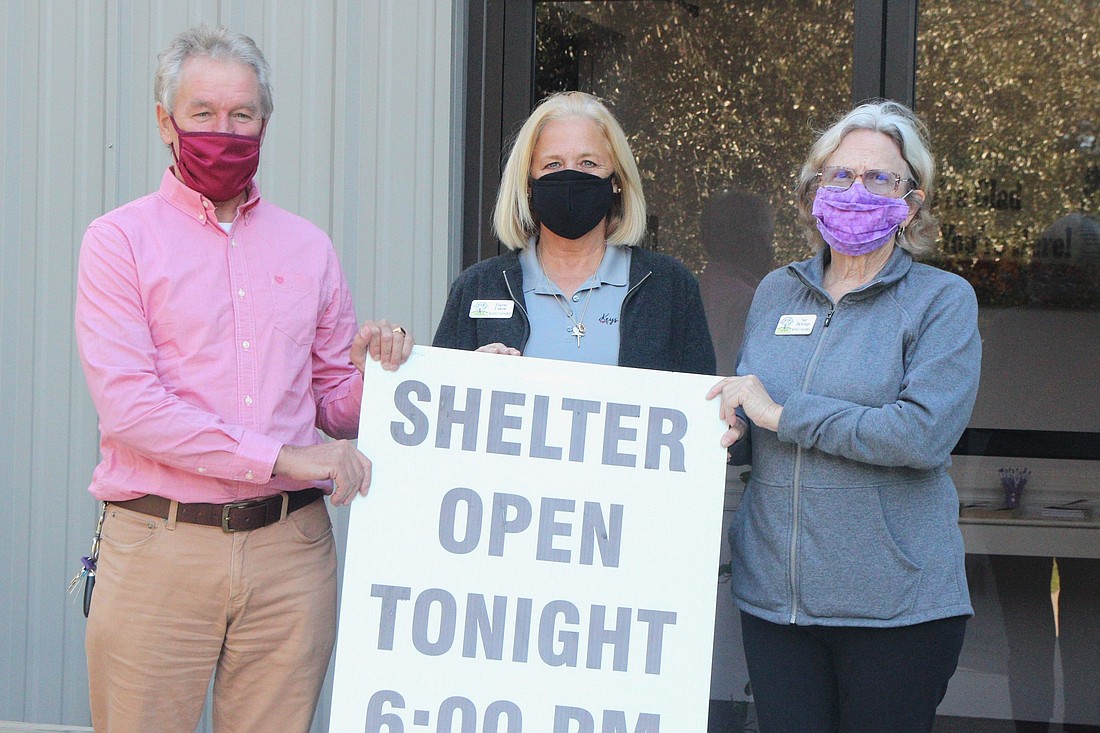- January 15, 2025
-
-
Loading

Loading

In the more than 10 years since Sue Bickings began working with homeless people through the Sheltering Tree — Flagler County's only cold-weather shelter — much has changed: The program has broadened and relocated, and, this year, COVID-19 has created new stresses for its guests.
"There's an awful lot of people who are not able to pay their rent; they’re not able to pay their utilities — maybe they’re able to pay part of those things," Bickings said. "Helping people with rent right now, that is the widespread need in this community."
"She continues to strive to serve those in need even during the challenges of COVID-19. She has spent the last decade in service to sheltering the homeless and hurting during the cold weather months."
— JAMES BELLINO, pastor, Church on the Rock
Although the Sheltering Tree is best known for providing people with a warm place to stay for the night when the weather is expected to dip below 40 degrees, it also provides other services, including food distribution on Tuesdays, connections to jobs and other area resources, and limited rent and utility assistance, in coordination with the county's human services department.
Combined, those services reach a broader swath of the community than the people who show up on cold nights because they don't have a home, or the one they have doesn't have heat; last year, the highest number of guests in one night was 19.
The nonprofit can often move quickly to help people who've received utility shutoff notices, Bickings said. Evictions are tougher – though the Sheltering Tree was recently able to help a woman with two disabled children keep her apartment and find new employment, said Martin Collins, vice chairman of the Sheltering Tree's board.
"Two years ago, we put a very big emphasis on helping the nearly homeless, to save them from becoming homeless — and that can be the difference of a utility bill," he said.
Bickings began volunteering for the Sheltering Tree when it was formed at the First United Methodist Church in Bunnell in 2008. After she retired from her position as a school counselor, she began devoting more time to the nonprofit in 2016.
"I’ve always been a servant: I served when I worked in the school district — I served at Buddy Taylor, and I served at Bunnell Elementary School — and felt that I had a mission there at both of those schools," she said. "So when that mission in my life ended, I saw one at my church.
"I am a servant," she added later, "because God has led me to this work where I see Jesus every day."
Alongside Sheltering Tree founder Carla Traister, Bickings helped open an office for the Sheltering Tree. People started calling for help, and the program began offering food assistance at the church on Tuesday mornings. After the program moved to the Church on the Rock, on U.S. 1, the county and local municipalities began to contribute funding.
When the air begins to chill, Bickings checks the Bunnell weather forecast hourly at weather.gov to see if she'll need to open the shelter — it takes time, so not reacting early enough to a weather shift could mean not being able to open.
"I believe that you should grow where you're planted, and I was planted at the Methodist Church in Bunnell," Bickings said. "It just gradually developed into heart for people who struggle. A lot of people struggle, but they hide it and you don’t see it. ... But when you talk to somebody who’s homeless, it’s out there: It's out there in the way they dress, the way they act. You know, people in houses have problems. They hide them. They look fine. But if you live on the street, maybe your problems show on the outside, and people reject you for that. And I don’t think that's fair."
Since COVID-19, the suffering she's seen in the community is different.
"The families are people who’ve never asked for help before — who could always support themselves," she said. "And now they find themselves with a loss of a job, with a little bit of unemployment that does not pay their mortgage, and they’re just dazed."
There's no common thread to who might need help, Collins said — especially now.
"We get to know them," Collins said, "and we find that they were truck drivers for 30 years and their back gave out, we find out that we have sports stars, we have women fleeing from domestic violence: These are ordinary people."
Keeping the shelter open in COVID-19 has necessitated new procedures to protect guests and volunteers — of which the Sheltering Tree has a shortage, particularly when it comes to people who can commit to spend a full night at the shelter.
"Overnighters are our largest need," Bickings said. "We must have overnighters in order to operate." The hours for the overnight shift are typically 10 p.m. to 6 a.m. "We are praying that we will not have to shut down due to COVID, so we’re doing our best with safety precautions, and it’s been a very unusual year."